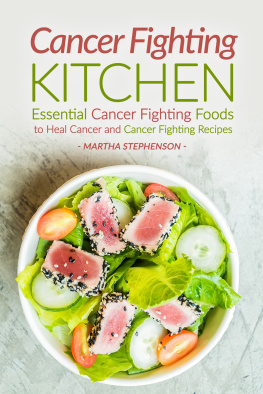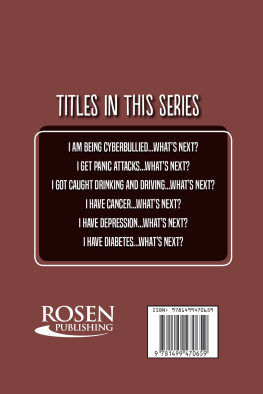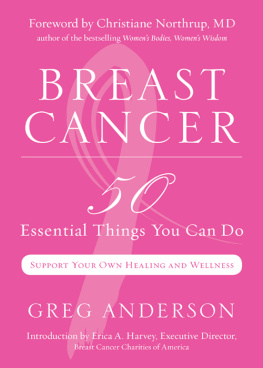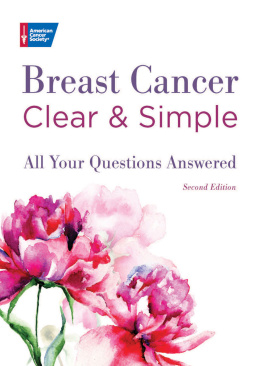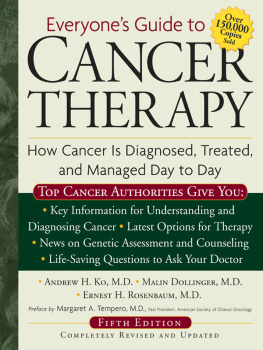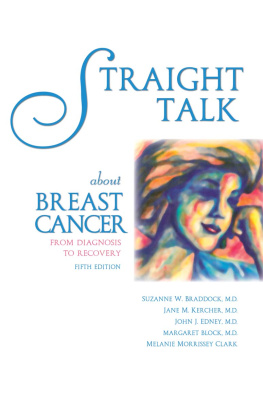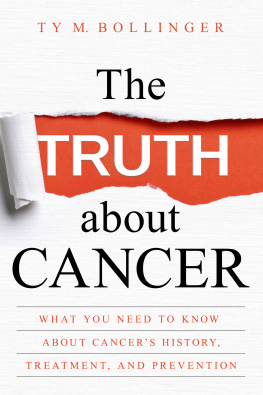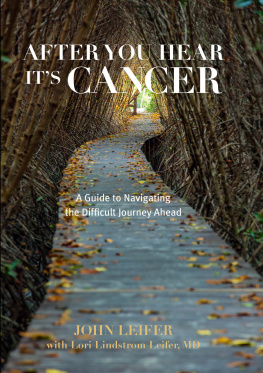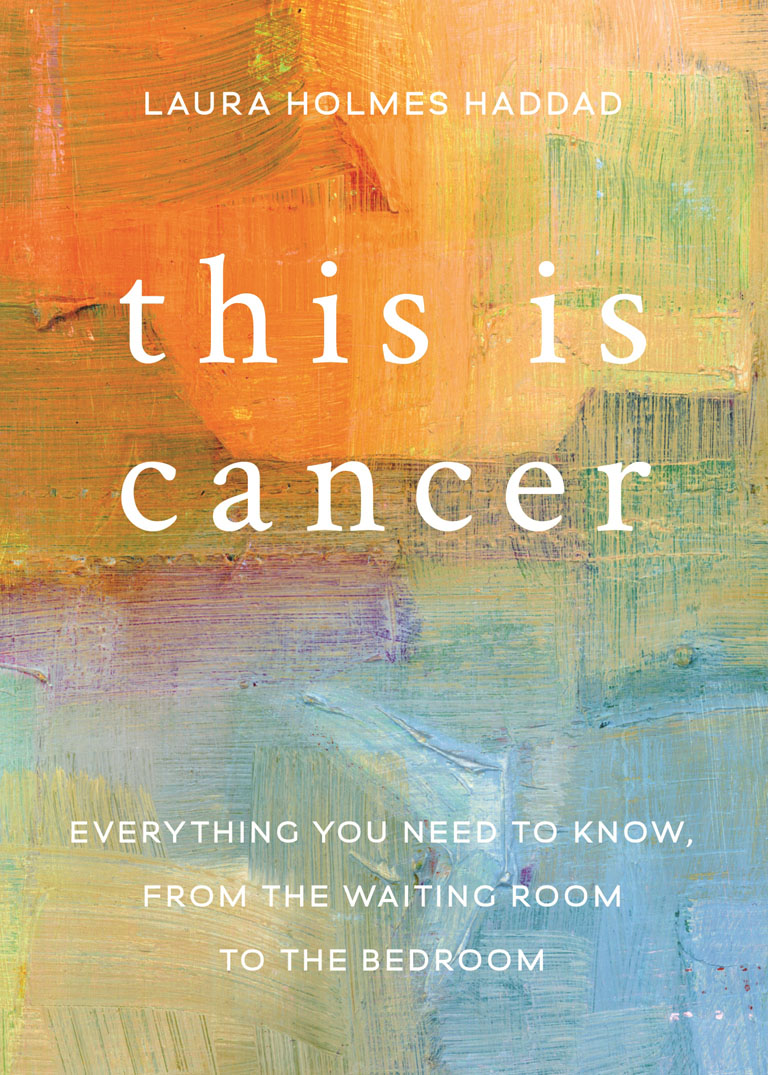

Copyright 2016 Laura Holmes Haddad
Seal Press
An imprint of Perseus Books,
A Hachette Book Group company
1700 Fourth Street
Berkeley, California
sealpress.com
All rights reserved. No part of this book may be reproduced or transmitted in any form without written permission from the publisher, except by reviewers who may quote brief excerpts in connection with a review.
Library of Congress Cataloging-in-Publication Data
Names: Haddad, Laura Holmes, author.
Title: This is cancer: everything you need to know, from the waiting room to the bedroom / by Laura Holmes Haddad.
Description: Berkeley, California: Seal Press, [2016]
Identifiers: LCCN 2016026471 | ISBN 9781580056274 (eBook)
Subjects: LCSH: Haddad, Laura Holmes,Health. | BreastCancerPatientsBiography. | WomenHealth and hygienePopular works. | CancerPopular works. | BISAC: HEALTH & FITNESS / Diseases / Cancer. | SELF-HELP / Motivational & Inspirational. | HEALTH & FITNESS / Womens Health.
Classification: LCC RC280.B8 H33 2016 | DDC 362.19699/4490092 [B]dc23
LC record available at https://lccn.loc.gov/2016026471
10 9 8 7 6 5 4 3 2 1
Cover design by Erin Seaward-Hiatt
Interior design by Domini Dragoone
Printed in the United States of America
To Penelope and Roman,
who inspire me every day;
To Lesley,
for your exquisite fight plan;
and to Mark Moasser, MD,
for never giving up on me.
When you look ahead it may seem too hard.
Look again.
Always look again.
Mary Anne Radmacher
Table of Contents
Guide
CONTENTS
This book is intended as a guide for cancer patients and caregivers, based on my own experiences as a young-ish breast cancer patient. It has been reviewed by an oncologist for spelling and clarification, but any mistakes are entirely my own. It is not intended to replace medical care; rather, it is a supplement to help you navigate the world of cancer.
I am a Stage IV inflammatory breast cancer survivor. I went from perfectly healthy (lots of yoga, lots of broccoli) to not feeling great to being told I had an extensive tumor in my left breast and cancer that had spread to my lymph nodes and potentially a rib. I was given roughly three to five years to live, all at the age of thirty-seven. With the help of an incredibly diligent family and a team of brilliant doctors and a tiny green chemotherapy clinical trial drug, Im still here. It is not an exaggeration to say its a miracle that Im alive. I am a survivor, and I am grateful.
Every cancer experience is unique, but as this book will show you, some of the moments along the way are universal. By way of introduction to methe person hoping to gain your trust and guide you through this messheres the concise tour of my treatment: I was diagnosed with inflammatory breast cancer (IBC) in November 2012. What makes inflammatory different from other types of breast cancer is how the cancer cells move: The malignant cancer cells block the lymph vessels in the skin, causing redness and swelling in the breast. A rare cancer that spreads rapidly, IBC is diagnosed in approximately 5,000 women in the United States every year. For those who like details, my cancer was ER-positive, PR-positive, and HER2-negative, and I was found to carry a mutated BRCA2 gene. I began chemotherapy within two weeks of diagnosis. When three rounds of Adriamycin/Cytoxan failed, I was told that a clinical drug trial was my only hope. I got into a Phase II clinical trial after being rejected five times. I was finally accepted into a non-randomized, non-placebo-controlled trial for a PARP inhibitor drug called veliparib (made by AbbVie, a spin-off of Abbott Laboratories) at the City of Hope National Medical Center in Duarte, California. To participate in the trial I was required to travel from Northern California to Southern California every week for six months to receive chemotherapy treatment and the accompanying scans and blood work. I had to leave my two young children with my husband, my mom, a babysitter, or my sister for anywhere from one to three days depending on the week. It was torture, mentally and physically.
When my counts were good, some visits ended with just a blood test and then a return trip to the airport, but other visits ended with a round of chemotherapy (Gemzar or carboplatin or both). I had to keep a trial-drug diary listing the dosage, time, and any side effects, as well as follow strict dietary and lifestyle guidelines. The financial and emotional toll was high; there was no insurance or financial coverage for the travel, only the treatment itself. Family, friends, and complete strangers donated air miles, rental car points, hotel rooms, and their time to travel with me. The treatment ended up workingit shrunk the tumor and qualified me for a non-skin-sparing double mastectomy, prophylactic salpingo-oophorectomy (removal of the ovaries and fallopian tubes), and removal of nineteen lymph nodes. That was followed by almost three months of intensive radiation therapy and then breast reconstruction one year later.
My surgery in August 2013 had clear margins, which means the surgeon got all the detectable cancer surgically. (Cancer cells were described to me by one surgeon as stars; the surgeons job is to remove the stars that have spread out in the targeted area. They get as many of those suckers as possible, but there might be one or two lingering that they cant find.) I have been disease-free since surgery, but I will always be Stage IV because after that number ranking they never downstage you; thats your number for life. I still see my oncologist every three months, still get blood work and scans three to four times a year, and will be on hormone therapy for the rest of my life. After about two years on the trial chemo drug, my oncologist took me off it (it had done its job, and the doctor feared that long-term use could cause another secondary type of cancer).
With that one phone call from Dr. Kelley in November 2012, I suddenly entered a world that I had always studiously ignored: the medical world. I hate to have my teeth cleaned, much less sit in paper gowns in waiting rooms and bare all. I used to be so terrified of doctors that Id break into hives across my chest, causing the doctors to immediately test for allergies. I didnt feel like myself for a couple of months before I went to my GP (general practitioner); I blamed it on being a tired mom. I felt pain in the left side of my chest and noticed some changes in my left breast, and after a round of antibiotics was ineffective, my doctor referred me to a breast surgeon. At no point did I think it could be cancer; everyone kept saying, Cancer doesnt hurt. I barely got to the breast surgeon for a diagnosis; I tried to put off the appointment so I could help cook that years Thanksgiving dinner. Dr. Kelley called me the morning after Thanksgiving at 7:00 AM to deliver the news. She told me she didnt like to do it over the phone, but she was in Georgia, and could I please sit down.
Within one hour of that phone call my husband and I were driving to the hospital so I could be admitted for tests and immediate treatment. I was so sick so quickly that much of it occurred in a blur.


